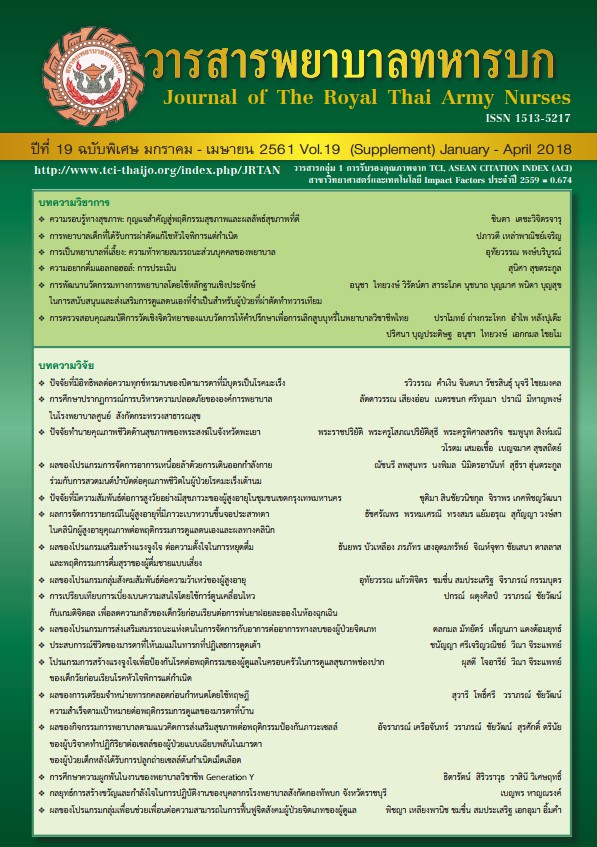The Effects of A Social Relationship Program on The Loneliness of Older
Keywords:
social relationship program, loneliness, elderly personsAbstract
This quasi-experimental research using a two-group pretest-posttest design aimed to examine the effects of a social relationship program on the loneliness of the elderly. The subjects of this research were 62 elderly persons aged 60 and over, who met the inclusion criteria. The subjects were randomly assigned to an experimental group (n = 31) and control group (n = 31). The experimental group participated in an eight - week social relationship program that was developed based on the concepts of social support and social networks, while the control group received regular care activities. The research instruments were the social group program and the loneliness scale. The content validity of the social relationship program was examined by three experts. The Cronbach’s alpha coefficient for the loneliness scale was .70. The data were analyzed using descriptive statistics, dependent t-test, and independent t-test. The results of the study were as follows = .1) After participating in the social relationship program the mean score for the loneliness of the experimental group (M = 28.13, SD = 5.96) was lower than the pretest score (M = 34.23, SD = 7.19) at a statistical significance (t = 16.39, p<.001). 2) The mean difference scores for the loneliness of the experimental group between before and after participating in the social relationship program ( = 6.10, SD = 2.07) was higher than that of the control group receiving normal regular care ( = .16, SD = 1.04) at a statistical significance (t = 15.045, p<.001).
Downloads
References
2. National statistical office. Report on the elderly population survey in Thailand 2014. Bangkok: Thana Place; 2014. (in Thai)
3. Institute of health systems research. Knowledge management and synthesis of hospital health promotion practices: Elderly services practices.
Bangkok: Saham printing and publishing; 2010. (in Thai)
4. Nunsubpawat V. Mental health of the elderly. Journal of nurse’s association of Thailand northeasters division.2009; 27(1): 27-32. (in Thai)
5. Hawkins, B. A., Principle and practice of activity programs.State College, PA: Venture. 2009.
6. Wilson, R. S., Krueger, K. R., Arnold, S. E., Schneider, J. A., Kelly, J.F., Barnes, L.L.,etal. Loneliness and risk of Alzheimer disease. Archives of General Psychiatry.2007; 64(2): 234-240.
7. Luo, Y., Hawkley, L. C., Waite, L. J., & Cacioppo, J. T. Loneliness, health, and mortality in old age: A national longitudinal study. Social Science and Medicine. 2010; 74(6): 907-914.
8. Cacioppo, J. T., Hughes, M. E., Waite, L. J., Hawkley, L. C., and Thisted, R. A. Loneliness as a specific risk factor for depressive symptoms: Cross-sectional and longitudinal analyses. Psychology and Aging. 2006; 21(1): 140-151.
9. Van Baarsen, B. Theories on coping with loss: The impact of social support and self-esteem on adjustment to emotional and social loneliness following a partner’s death in later life. Journal of Gerontology: Social Sciences.2002; 57: 33-42.
10. Ayalon, L. andShiovitz-Ezra, S.The relationship between loneliness and passive death wishes in the second half of life. International Psychogerıatrıcs. 2011; 23(10): 1677-1685.
11. Adams, K. B., Sanders, S., & Auth, E.Risk Factors of Depression and Loneliness in an Independent Living Retirement Community. Aging & Mental
Health.2004; 8(6): 475–485.
12. Victor, C. R., Scambler, S. J., Bowling, A. N. N., and Bond, J.The prevalence of, & risk factors for, loneliness in later life: a survey of older people in Great Britain. Ageing and Society. 2005; 25(3): 357-375.
13. Pinquart, Martin, Sörensen, Silvia. Influences on loneliness in older adults: A meta-Analysis. Basic and Applied Social Psychology. 2001; 23(4): 245-266
14. Cattan M, White M, Bond J, Learmouth A. Preventing social isolation and loneliness among older people: A systematic review of health promotion interventions. Ageing & Society. 2005; 25: 41–67.
15. Phimphachiyaboon L. Factors influencing loneliness of the elderly in social welfare development center for older for older persons: Burapha University; 2015. (in Thai).
16. Heaney C. & Israel B.Social networks and social support. In: Glanz K, Rimer BK, Lewis FM, editors. Health behavior and health education: Theory, research and practice. 3rd ed. Jossey-Bass; San Francisco, CA: 2002:185–202.
17. Choi NG, Wodarski JS. The relationship between social support and health status of elderly people: Does social support slow down physical and functional deterioration. Soc Work Res. 1996; 20(1): 52-63.
18. Damrikanlert L. Situation and the needs of elderly care in the community, in: Sriwanitchakarn S, Editors. Elderly care integrated in the communit. Nakornpratom:T Q P; 2012; 11-9. (in Thai)
19. Hazer, O., & Boylu, A. A. (2010).The examination of the factor affecting the feeling of loneliness of the elderly. Procedia Social and behavioral Sciences. 2010; 9: 2083-2089.
20. Thanakwang, K., Ingersoll – Dayton, B., & Soonthorndhada, K. The relationships among family, friends, and psychological well - being for Thai elderly. Aging and Mental Health.2012; 16 (8): 993 - 1003
21. Malathum P, Kongiem J, Intarasombat P. Relationships of family support and friend support to life satisfaction of older adults in rural areas. Rama Nurse J. 2009; 15(3): 431-48. (in Thai)
22. Malekafzali H, Eftekhari MB, Hejazi F, Khojasteh T, Noot R. The effectiveness of educational intervention in the health promotion in elderly people. Iran J Public Health. 2010; 39(2): 18
23. Kodchana C, Virasiri S. The effecct of social support group on grandmothers, childrearing abilities and stress during raising preschool grandchildren in Phu Kradueng District Loei Province .Thailand J of Health Promotion and Environmental Health. 2010; 33(2): 42-52. (in Thai)
24. Petburi P. The effect of a social support program on the mental health of the elderly: Thammasat University; 2016. (in Thai).
25. Chaihan R, Nanthamongkolchai S, Thechaboonsermsak P, Munsawaengsub C. Effect of social participatory training program on self-esteem of the elderly in La-un district Ranong province. J of Public Health. 2010; 40(1): 76-85. (in Thai).
Downloads
Published
How to Cite
Issue
Section
License
บทความหรือข้อคิดเห็นใดใดที่ปรากฏในวารสารพยาบาลทหารบกเป็นวรรณกรรมของผู้เขียน ซึ่งบรรณาธิการหรือสมาคมพยาบาลทหารบก ไม่จำเป็นต้องเห็นด้วย
บทความที่ได้รับการตีพิมพ์เป็นลิขสิทธิ์ของวารสารพยาบาลทหารบก
The ideas and opinions expressed in the Journal of The Royal Thai Army Nurses are those of the authors and not necessarily those
of the editor or Royal Thai Army Nurses Association.






